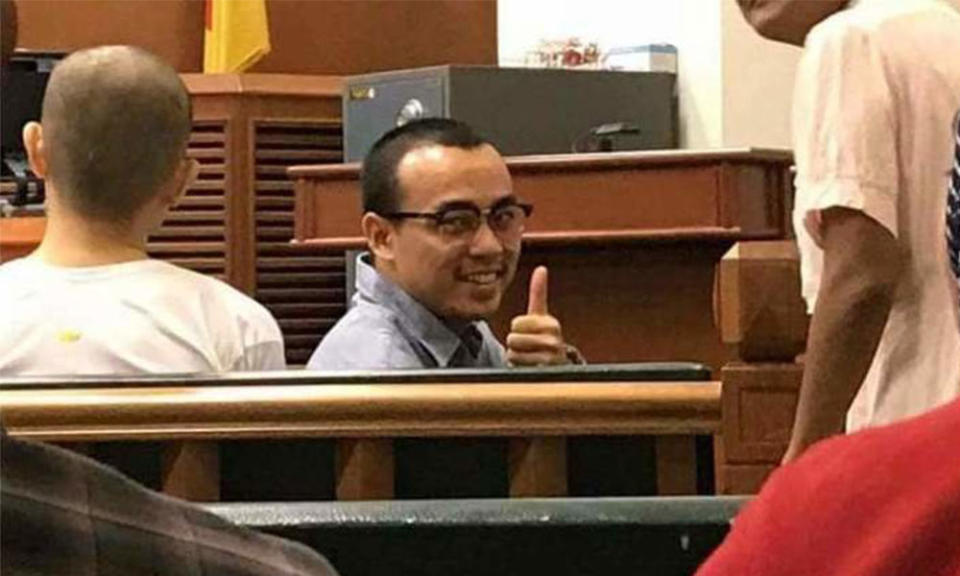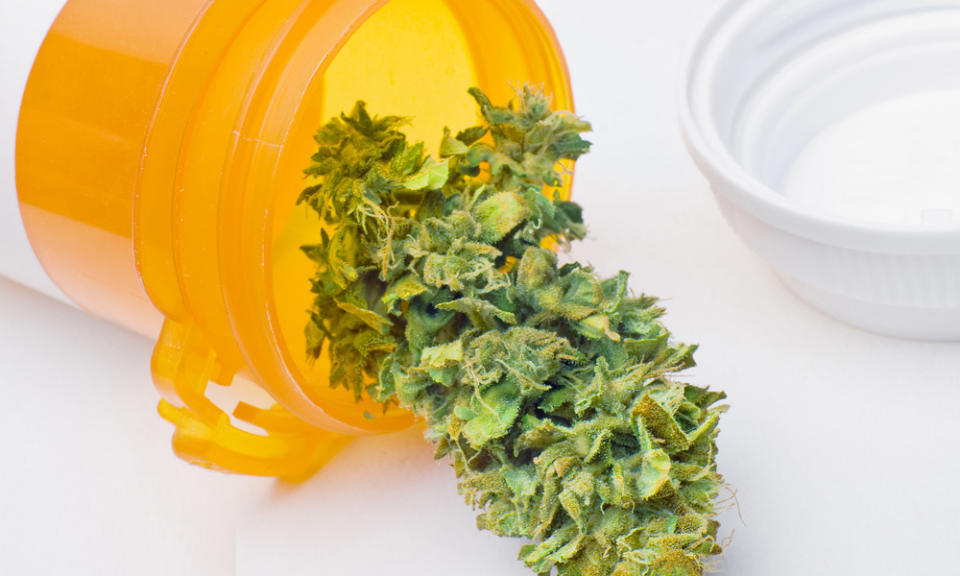Freed unexpectedly from death row, Lukman sets sights on religious studies

On Dec 7, 2015, the world of Muhammad Lukman Mohamad was turned upside down. The engineer was arrested along with his then-pregnant wife for possessing, processing and distributing cannabis oil.
Even though she was eventually released on Aug 30, 2018, Lukman (above) was sentenced to death under the Dangerous Drugs Act for possession of 3.1 litres of cannabis oil, 279g of compressed cannabis and 1.4kg of substances containing tetrahydrocannabinol (THC).
But a month ago on Feb 17, it all turned around when a three-member Federal Court bench led by Chief Justice Tengku Maimun Tuan Mat allowed his appeal to set aside his conviction on two counts of drug trafficking.
They substituted the charges to possession under Section 9 of the Dangerous Drugs Act (DDA) and sentenced him to five years in jail on each charge and which are to run concurrently from the date of his arrest.
And because the Court of Appeal last year reduced the third charge to one of possession and sentenced Lukman to seven years’ jail and 10 strokes of the cane, he was deemed to have completed his jail term with a one-third remission.
The caning was administered and Lukman was freed that night itself and taken to his sister's house in Kota Bharu to rest and receive treatment.
After two weeks, he moved to his hometown in Besut, Terengganu where he is still recuperating. Yesterday, a month on from that emotional day, Lukman shared his story with Malaysiakini.
The fifth child in a family of six, Lukman had worked as a quality control (QC) inspector and a project QC engineer for about a year before he was busted in a sting operation.

“At first, I started hanging out together with some friends and then one of my friends told us that he had an aunt with cancer and his wife had hypothyroidism and then he did his own research and read about the alternative treatment using medical marijuana.
“We started working together. He brought the raw materials to me. We just helped him to make the oil for patients and then after about three months, there were good results.
“We began to be known on the Facebook community, under Malaysian Medical Marijuana and those on social media were spreading the news on cannabis benefits. After the news spread, more and more people would come and ask for help.”
Medical relief effort
Indeed, many studies and claims about glaucoma and cancer pain relief helped the legalisation of medical marijuana and cannabis oil in Western countries.
Dronabinol, a pharmaceutical form of marijuana’s active ingredient THC, has been approved by the US Food and Drug Administration as an appetite stimulant for people with Aids and an antiemetic (anti-nausea) for people receiving chemotherapy under the trade names Marinol and Syndros. It is available by prescription in the United States, Canada, Germany and New Zealand.
In fact, some countries have also decriminalised marijuana as a recreational drug.
READ MORE: KiniGuide on medical marijuana
However, in Malaysia in 2015, nothing had changed and many prisoners on death row were there for ‘soft drug’ offences.
Lukman says he knew that there were harsh laws and severe penalties for drug traffickers but he did not equate them with the work he was doing which he saw as providing medical relief to those who were suffering.
“When people were happy, I continued doing it. It organically became more like a business. From what I know, the police Narcotics Division was aware of our activities for nearly a year. They opened the file one year before they caught me.
“They already had my information, they already know where I lived. I think maybe they also caught some people and asked where they got it from.”

The case against him had a number of questionable elements including technicalities over the testimony of the chemist who admitted that it was the first time he was handling the product. But nonetheless, the court went ahead and pronounced the death sentence.
Lukman said he never imagined that he would find himself behind bars and facing death. “They targetted me as a big drug dealer, a big syndicate producing drugs in a laboratory. When they came to my house there was nothing. No lab, no fancy furniture and cars. I lived a simple life.”
Despite being surprised that his operation was such a small affair, Bukit Aman nonetheless proceeded with the case against Lukman.
“At that time, vaping was booming in Malaysia and they wanted to try to crack down on it,” he recalled, adding that he was incorrectly portrayed in the Malay press as a producer of ganja vape liquid.
“The intention is way different,” he said.
'Prison difficult but helped'
His time in prison was not a tormented one, says Lukman.
“Luckily, I was not bullied or ill-treated in prison. Maybe this is what God wanted for me. In some ways, prison helped me. Over the last few months, I have been asking for God’s favour, but I leave everything to him.”
He read a lot in prison, but as a prisoner on 'Banduan Akhir' (death row), he was not able to study formally.
“In the Kajang Prison, if you have a 10 to 15-year sentence, you can further your studies, but if you are sentenced to death but waiting for your appeal, there is no chance for you to work or to study.”
Around the time of his sentencing, the Pakatan Harapan government announced a moratorium on executions while it studied the full or partial abolition of the death penalty.
“I was very worried about the death penalty. But I still had hope. I hoped for the best for me. I hoped for the best for the laws on marijuana to be reformed. It’s too bad if they continued to uphold the death sentence for marijuana possession.”

Lukman recounted the fate of another prisoner who has spent his last 32 years in prison for possession of around three kilos of marijuana. “We need to change the laws."
He said that on death row, there was one cell for one person but while in remand, a room the same size could have eight or 10 or even more prisoners.
“This makes it very difficult to eat or sleep and you have to adapt to the space," he said.
In 2018, when Lukman received the death sentence, this writer penned a column highlighting how Malaysia’s laws were out of step with the prevailing trends of treating medical marijuana differently.
Permatang Pauh MP Nurul Izzah Anwar and Kuala Langat MP Dr Xavier Jayakumar were sympathetic to Lukman’s plight. The latter promised to bring the issue to the cabinet and this was followed by then prime minister Dr Mahathir Mohamad's call for a review of Lukman’s case.
This was supported by then law minister, the late Liew Vui Keong and then health minister Dzulkefly Ahmad. However, despite this support, the Dangerous Drugs Act was not amended by the Harapan government and Lukman’s sentence still prevailed.
“Even though there was this moratorium, if you are on death row, the chances of being released are so low," said Lukman. “The chances are very low, but I just let God decide for me. I never knew that I was going to be freed that day.”
He said due to the prayers of his family and the joy of the news of his release, he was able to endure the pain of the punishing rotan strokes.
Now a free man again, Lukman, who went through a divorce while in prison, has met up with his child.
“I am very grateful to the prison authorities who took care of my welfare while I was there. And my family, friends and supporters who helped me and prayed for me and supported me all throughout this.
"Also I have a lot of gratitude and appreciation for my lawyer Hisyam Teh and team, and also Farhan Maarof who stuck with me from the High Court.
“My humble advice to people is that even though we believe in the benefit of medical marijuana, we cannot simply do what we want and go against the law.”

For now, he wants to further himself in Islamic studies. “That’s what I want, and that’s what my mother would like as well. Later on, I want to get credentials for the scientific study and advocacy of medical marijuana,” he said.
He added that he still does believe there should be advocacy for legalising cannabis oil and introducing less harsh drug penalties in Malaysia.
Lukman also called on Malaysians to be open-minded and positive in life.
More advocacy needed
Lukman’s is not the only such case of its kind. Retired armed forces captain Amiruddin @ Nadajaran Abdullah, better known as 'Dr Ganja', is still facing the death penalty.
Amiruddin has been held in detention, first being charged in May 2017. He is facing 33 charges under the Dangerous Drugs Act after police reportedly found substantial quantities of cannabis at his home in Kampung Delek Dalam, Klang.
He has been battling cancer while in custody and has only one functioning kidney. His case is still ongoing and tomorrow, the High Court will set a new hearing date.
The battle for drug law reform is an ongoing one and both former minister Liew and leading medical marijuana decriminalisation advocate Yuuki Setsuna have passed away in recent times.
On June 27, 2019, Dzulkefly announced that the government planned to work towards removing criminal penalties for the personal possession and use of drugs and treat drug use and addiction as a complex chronic relapsing medical condition rather than a crime.
However, as with most of Harapan policy announcements on the matter, the laws were never changed, leaving Malaysia with its still harsh penalties.

Drug policy reform advocate Samantha Chong told Malaysiakini that the definition of cannabis in the Dangerous Drugs Act was still too general and included chemical compounds which were not addictive but widely used for chronic pain management and epilepsy in other countries.
“In Malaysia, possession of more than 200 grammes (a market value of RM500) of cannabis attracts the presumption of trafficking and the death penalty. We need to follow the science and review our laws accordingly.
"Even the International Narcotics Control Board, which is the independent body monitoring compliance with international drug control conventions has reiterated its call for the abolition of the death penalty for drug-related offences because it is disproportionate to the crime," she said.
“Drug addiction is a complex problem and the death penalty is simply not the solution. The war on drugs has failed and we should not repeat the same mistake,” Chong added.


